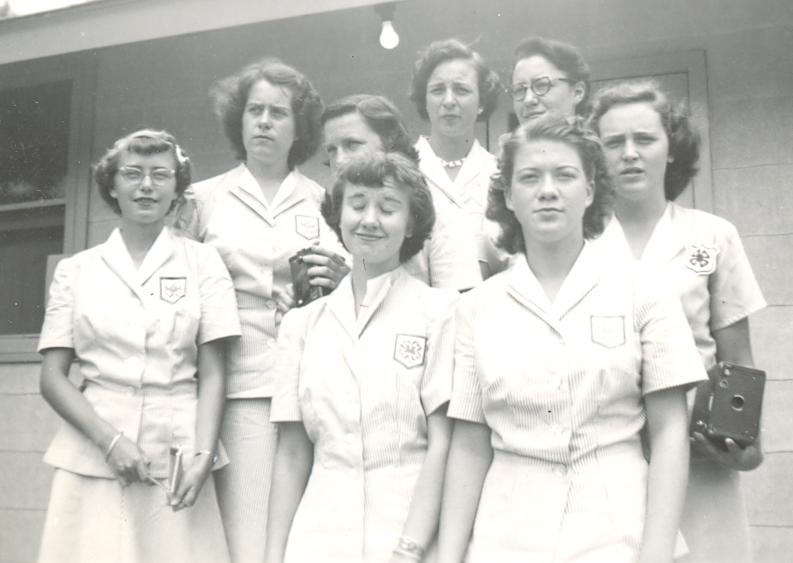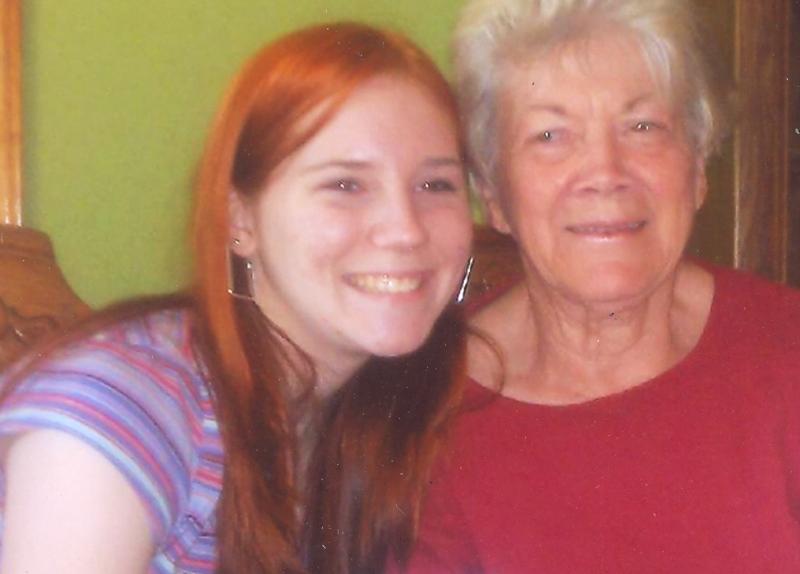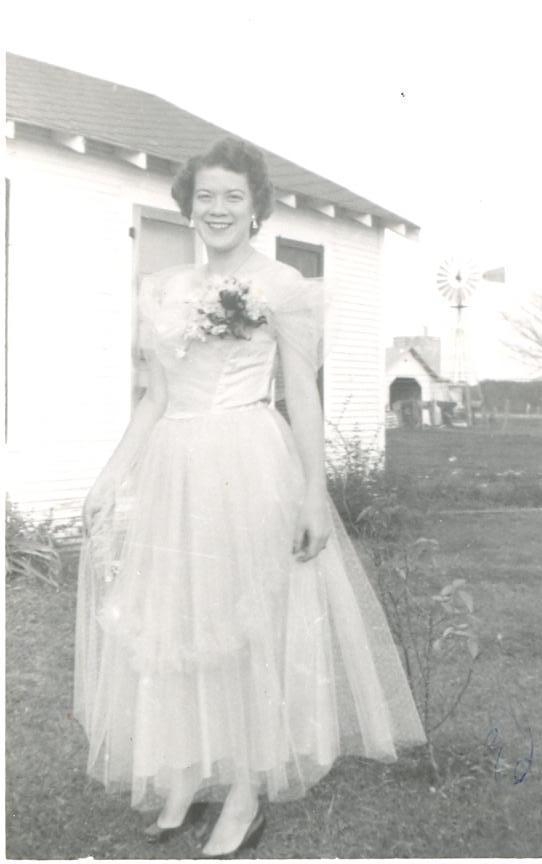TRANSCRIPTION
What do you remember most about your childhood?
"Oh, what I most remember…We had to get outside and raked leaves. We had just a dirt road and we had to get out and rack all that up, Daddy made us clean it up until it was spotless. We had flowers around and we had to rack that up. That's what I remember most. But I'd rather be in the house cleaning. We had to sweep out the house and then put buckets of water on the floor and sweep the dirt outside. We did that, we milked cows, had some goats and sheep, played with our animals, dogs and cats. And I had a little cat I was crazy about. He was laying on the step one day and Aunt Weedy stepped right into the middle of him and hurt his back. It finally got and killed him. I really liked that kitty."(Light Chuckle)
What was a typical day like in Dripping Springs?
"Oh, we'd just go around with our friends and I worked in a grocery store. Aunt Weedy worked in a drug store. It was a very small little town so everybody knew everybody wherever you went. It was really nice, we enjoyed it."
Was it hard having to move in your last year of high school?
"Yes, it was hard. But we still got to go to the same school, but we had to move from house to house."

What was one thing the kept you going during hard times?
"I guess it was Nanny encouraging us. She helped us to keep going."(Nanny is Eleanor's mother)
Why did you choose to go to beauty school?
"I loved to fix hair and makeup. So it was something that I wanted to do."
Why did you quit nursing school?
"Because we didn't have calculus and a lot of math that we needed. Our high school didn't teach that so we didn't have it. It kind of threw us down so we just quit. And grandpa was having a hard time paying for it, so we just quit."
Where you and Weedy grouped a lot together and did it bother you?
"Yeah, I guess we were cause we played volleyball and basketball together. We were together most of the time. It didn't bother me, it was just the way things were."
Did you ever want to go back to nursing school?
"Not really, I enjoyed it but not really. I got married so that kind of knocked that out for me."
What was Wool Co.?
"It was a clothing store in San Antonio. I don't think they have any of them open anymore. I worked the cash register. I enjoyed working there."
Where did you meet your husband?
"Dripping Springs. He went to school there too and graduated before I did."(Loud laugh)

Did you like it when he became a police officer?
"Well. It was a job, but I knew it might not be safe. It was okay. We managed."
Did his job make life harder?
"Yes it did because of his shifts. And when he had to sleep during the day, I had to take the kids outside so they would be quite so they wouldn't wake him up." (Loud Laugh)
Did you plan to have a large family?
"No, just three was about all we wanted."

Was there a lot of discrimination in your town?
"No, there wasn't. Well, there were Mexicans there, but they were real nice. They were nice people. They'd help you when you were sick. They came and helped mother when she got the flu, she was in bed so they came and stayed with us."
Where there a lot of places to go out to?
"No, not really. There were a few drive-in movies, the theaters we went to back then, but that was about it. We did go to see Elvis Presley when he came to Austin. When Bob and I were first dating, he was already pretty famous. Everybody knew who he was. That was in about '55. Bob came and we didn't know which of us he was going to take, so both Weedy and I got ready. When he chose me, Daddy took Weedy to the concert also. It was always like that. When I won a trip from my 4H club to Bastrop Daddy taught Weedy how to drive. So it was balanced out."
Was there anything I didn't ask you about that you would like other people to know about your life?
"Well, that I'm proud of my kids and my life."


ANALYSIS
What I learned most from doing this oral history project was that our perceptions of what the past was like is not entirely true. People got around just like we do today just without the technology. The most important points were that even though my grandma had an ordinary life it was still one to which she would never trade anything for. I learned how strong my grandma was and how even though she had a hard childhood; she came out laughing all the way. My view did change on this topic because I expected there to be more racism in a small town, but besides that my view did not change. My grandma expressed her feelings by how she laughed almost the whole time. This a very effective way to learn about the past because it helps you relate it back to your own life.
TIMELINE
- 1934: Eleanor Lee Anderson was born in San Antonio, Texas
- 1952: Moved from Mt. Gainor, TX to Dripping Springs, TX
- 1953: Voted homecoming queen of her high school graduating class
- 1954: Attended nursing school at Brackenridge Hospital in Austin
- 1955: Dropped out of nursing school
- 1955: She married Robert Garnett on June 11 and moved to Houston
- 1956:had her first child Thomas, a son, March 15 and moved to Bryan, TX
- 1957: had a second child Robbie, a girl, on August 15
- 1958: moved to San Antonio
- 1961: Had a third child Robert Jr., another son, was born April 3
- 1962: Went to "Beauty School" where she became a hairdresser.
- Late 1960s: Worked at Wool Co.
- 2008: Moved to Wimberley
- 2008: Interviewed by Sara Turner on October 18.
ANNOTATED BIBLIOGRAPHY
- The Handbook of Texas Online
is a multidisciplinary encyclopedia of Texas history, geography, and culture sponsored by the
Texas State Historical Association and the General Libraries at UT-Austin. It was produced
in partnership with the College of Liberal Arts and the General Libraries at the University of
Texas at Austin. Copyright © The Texas State Historical Association.
- Discount stores of the 60s. It was put up in 1999 and has been edited all the way up to 2008. This shows various stores that were the Walmart of their time. Wool Co. is included in this website on page 3.
- Small Town Texas Projects. Palo Alto College student/s Sabrina Seronello & Jeanne Hayden project on the town of Wimberley, Texas. This Small Town Project was completed in the fall semester of 2006 as a requirement for Assistant Professor of Robert Hines's History 1302 class.
- Elvis Presley in Concert: Early Shows.. Copyright © 1996-2009, Elvisconcerts.com by Francesc Lopez. This website provides an extensive list of all the concerts that Elvis Prseley performed. My grandma went to see him in concert on her first date with her future husband Robert on either August 25th or October 6th, 1955 in Austin, Texas.
- Photographs and/or documents on this website were provided by Eleanor Garnett. These photographs were found in the garage of my grandparents' house. They are pictures of Eleanor's childhood, her school years, when she was dating, and her wedding.
Return to Oral History Projects

